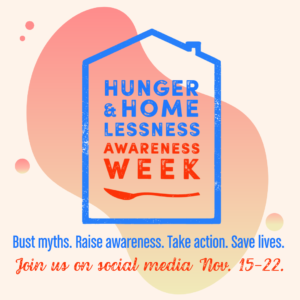There are many misconceptions about hunger, homeless, and the people who suffer from them. We’re debunking some of those myths during Hunger and Homelessness Awareness Week.
Myth #1: People Choose to Be Homeless.
The Majority of the people we meet are homeless due to circumstances beyond their control or external factors. We know many people are only a paycheck or two away from financial disaster if something happens to their source of income. These people, if they are not able to re-enter the workforce quickly due to illness or disability will run up their credit cards, borrow money from their social network and sell items of value in an attempt to preserve their housing. Once they run out of options they become literally homeless. Whatever the financial bottom line is for each of us, we have the potential to run out of resources and become someone experiencing homelessness. Loss of resources is not a choice.
Secondly, women who do not have children in their care and who are experiencing domestic violence do not qualify for DHS relocation funds. The DV she is experiencing can be just as brutal, but her pathways to exiting that relationship are more limited and sometimes exiting into literal homelessness is her only option. When shelter beds and DV program beds fill up and her social network has usually been cut off by the abuser her only choice is to leave. That is not a choice.
Myth #2: Homelessness Isn’t My Problem.
If we live in a community where all of our community members do not have access to shelter, it is our problem. People experiencing homelessness are our neighbors, despite not having an address or a door to close to keep them safe at night. The cost of homelessness is much greater than the cost of creating housing solutions. People who experience homelessness are at a greater risk for major health conditions costing significant money to treat due to lack of or inadequate preventative care. The cost of warehousing people in shelters is tremendous. I prefer my tax dollars and donations go toward preserving the dignity of my neighbors who don’t yet have a place to call home and to assist them in moving toward housing.

